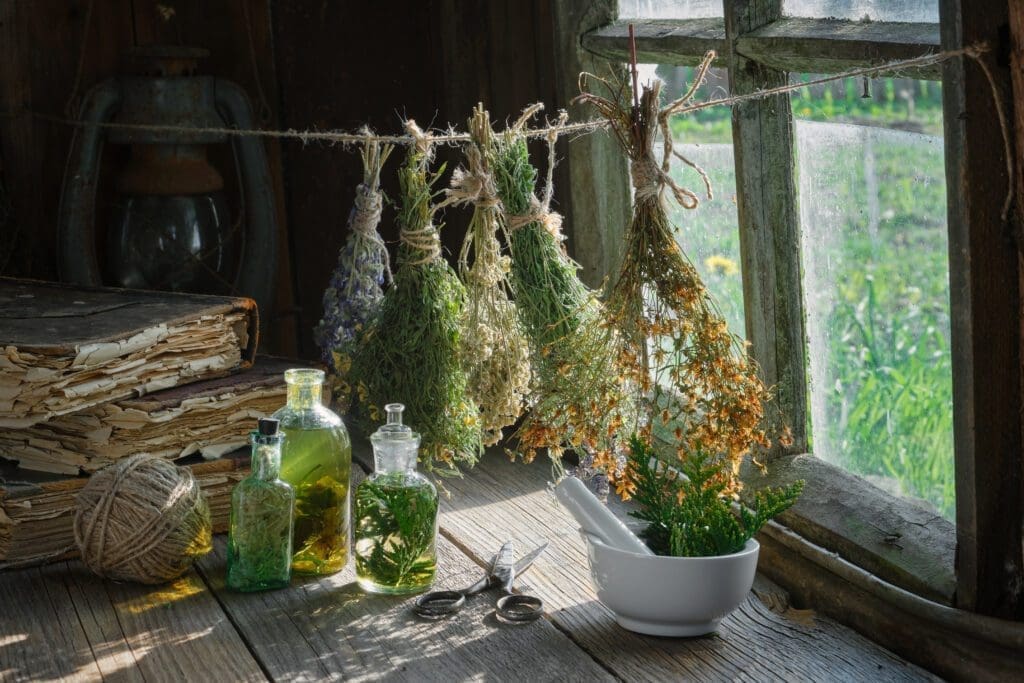Starting a herbal products company can be a daunting yet rewarding experience. Herbs are beneficial for medicinal purposes, cooking, and even cosmetics. You will learn everything- from their history to growing them at home. We will also dive into their medicinal and health usage, cosmetic benefits, and culinary uses. Additionally, we will guide you through selling online – from wholesale purchasing to drop shipping to customers. So let’s begin your journey towards creating a successful herbal products company!
What are Herbs?
Herbs are plants used for medicinal, culinary, or aromatic purposes. Some household names include basil, lavender, peppermint, ashwagandha, Triphala, and chamomile. They have been employed in traditional medicine for centuries and offer various health benefits. Starting a herbal product business requires comprehensive knowledge and its uses.
What are the Ten most used herbs in the U.K?
1. Basil
2. Cilantro
3. Oregano
4. Rosemary
5. Sage
6. Thyme
7. Mint
8. Dill
9. Parsley
10. Bay leaves
The History
Herbs have been an integral part of human life since ancient times. They are used not just for medicinal purposes but also for culinary and aromatic needs. Knowing the history and traditional uses will help to develop new herbal products that cater to current market demands. With increasing awareness about their fantastic health benefits across different cultures worldwide and are becoming popular in modern medicine and supplements.
Home Grown Herbs
Growing culinary and medicinal herbs at home is a rewarding experience that guarantees a fresh supply of aromatic and flavourful seasoning herbs all year round. Choosing the appropriate varieties curated by local herb growers or members of Facebook groups devoted to gardening can be enlightening. Sunlight exposure and adequate watering, and soil nutrition are critical in promoting healthy growth. Timing the harvest ensures maximum potency and flavour during use in herbal medicine or as seasoning for delectable meals. Drying or freezing excess produce offers alternative preservation methods.
https://www.instagram.com/andygrowsherbs/
https://instagram.com/joybileefarm/
Herbs in Medicine and Health
Since olden times, people have been using herbs for various medicinal purposes across different cultures around the globe. These remedies have only increased with time; even modern healthcare relies heavily on them. We must also comprehend possible risks while taking full advantage of these natural products’ benefits. Following regulations while manufacturing and selling these natural products is extremely important to maintain quality and authenticity. With the right marketing strategy, one can easily reach their target audience in this industry using social media platforms such as Facebook, Instagram ( for video promotions), or email campaigns, offering customers high-quality botanicals and reliable sources of information.
Herbal Cosmetics and Benefits
Herbal cosmetics are gaining popularity among people who want safe and effective skincare products. These products have natural ingredients such as rosemary, chamomile, lavender, turmeric, cinnamon, and anise. Aromatic herbs like sage, thyme, mint, and bay leaf also play a part in cosmetic formulations for their fragrance. To add more value to your offerings, consider packaging your herbal orders in eco-friendly containers made from bamboo or glass. Promoting on Social media can be used as an effective medium or even selling them on a cheaper Haqeemi herbs marketplace or by starting a blog about gardening or herbalism to attract potential retail or wholesale buyers.
Herbs for Culinary Use
Herbs are truly versatile in the culinary world. These aromatic plants, such as sage, rosemary, thyme, parsley, coriander, basil, and oregano, can enhance any dish with their distinct flavours and health benefits. To ensure you always have them fresh for seasoning blends or garnishes like tarragon and chives, grow your fresh herbs garden indoors or outdoors. Pay attention to the power of fresh culinary herbs, whether preparing a home-cooked meal or mixing up a cocktail or mocktail.
Sage for Cooking
Sage is a well-known herb in the kitchen with many uses in cooking and herbal medicine. It has a slightly bitter flavour and an earthy aroma that pairs well with meats, soups, and stews. Sage is also known for its medicinal properties, such as improving digestion and reducing inflammation. When infused in teas or tinctures, this powerful herb can help to soothe sore throats and coughs. Sage is also a popular plant for landscaping due to its attractive grey-green foliage and delicate purple flowers. Adding sage seasoning can make your culinary dish more flavourful and aromatic. With its warm and earthy flavour, sage goes hand in hand with other culinary herbs like thyme and rosemary. Whether cooking poultry, stuffing, or soups, adding dried or fresh sage leaves can elevate your dish to a new level.
Parsley and Coriander for Garnishing
When adding that extra flavour to your dishes without overpowering them with more potent spices or condiments, you can never go wrong with parsley and coriander as two of your top options for garnishing. Parsley offers a mild but slightly bitter taste, while coriander amps up your dishes’ flavour profile with its pungent notes – both are versatile enough to be used across different cuisines, such as Indian or Middle Eastern culinary traditions. You can even harvest these fresh herbs at home once you get the hang of growing them! Remember to chop finely before sprinkling them over your dishes as a finishing touch.
Basil and Oregano for Pizza
Elevate the taste of your homemade pizzas by using fresh herbs like basil and oregano. While basil provides a sweet, slightly peppery flavour, oregano has a robust, earthy flavour commonly used in Italian cuisine. These two popular culinary herbal plants can be quickly grown at home or sourced from local markets for that authentic taste. Refrain from settling for bland pizza when you can add aromatic and flavourful ingredients such as fresh herbs to your dishes.
Tarragon in Chicken Salad
Experimenting with different herbs like sage, rosemary, coriander, parsley, basil, and tarragon in a chicken salad can lead to exciting flavour combinations that will surely delight your taste buds. Use chives or oregano instead of tarragon if you want something different. If you’re running an e-commerce business selling herbal products or culinary herbs via social media platforms like Facebook groups, consider pricing, packaging, and branding carefully, as customers often associate the quality of the product with its presentation. Customers interested in growing their herbs at home may benefit from joining herb growers’ groups on Pinterest or Instagram.
Selling Herbs Online
Conducting in-depth market research and identifying a profitable niche to sell your products successfully online is crucial. This process will help you establish a unique selling proposition that separates you from competitors. Next, find reputable suppliers selling high-quality products, delivering the best customer service, which ensures continued customer satisfaction. An online presence on social media platforms, your website, selling on different marketplaces, or even social chat groups can help you reach a larger audience and get valuable product feedback. Offering email newsletters allows you to keep customers informed about new product releases and special promotions. Packaging and pricing are essential in making your herbal products attractive to potential buyers. Utilize gardening tips for growing your herbs, such as sage or coriander for seasoning and garnishing for base.
https://chestnutherbs.com/ref/19/
https://loveyouhome.ua/posuda-dlya-kuhni/kastryuli-kovshi/
https://www.hindawi.com/journals/mi/2017/6280925/
https://instagram.com/joybileefarm/
Wholesale Herbs for Resale
Starting a herbal products business can be cost-effective with wholesale options—research potential suppliers’ credibility and certifications before purchasing wholesale herbs. Offering a wide variety of herb blends can help you attract more customers while saving money on shipping costs by buying in bulk. This strategy will ensure higher profits and increased customer satisfaction.
Dropshipping Herbs B2C.
Drop shipping herbs can be a great option when starting a herbal products business. Partnering with a reliable supplier who handles your inventory and shipping directly to customers saves money on overhead costs. Instead of worrying about packaging and shipping orders, you can focus on expanding your e-commerce store or online presence. But before choosing a drop shipping supplier for your herbal products, carefully research their reputation and certifications to sell online. Consider factors like product quality, customer service, and shipping times. You can offer high-quality herbs and spices through your online store or Facebook group without the stress of packaging or shipping them yourself.
Hybrid Model of Bulk & Dropshipping
The hybrid bulk purchasing and drop shipping model is cost-effective for starting your herbal products company. Combining the two methods mentioned above can save money on inventory storage while maximizing profits. Choosing top-notch suppliers with quick shipping times and high-quality products is essential in this business model. Increase your visibility online and reach new customers through social media advertising or influencer partnerships. Staying up-to-date with industry regulations will ensure your business is booming in the long run.
Frequently Asked Questions
What to avoid when starting a herbal business?
When starting a herbal products company, avoid common mistakes like launching without sufficient market research, underestimating production and marketing costs, disregarding regulations, and neglecting to build a robust online presence through social media and e-commerce platforms.
What are the legal requirements for a Herbal start-up company?
Starting a herbal products company requires compliance with country and state-specific legal requirements. In the U.S., the F.D.A. regulates such products, and adherence to labelling and safety standards is mandatory. Incorporation and obtaining necessary permits and licenses are essential. Consulting with a legal expert or business consultant is advisable to ensure compliance.
Are there any certifications or qualifications necessary for creating and selling herbal products?
The requirements for creating and selling herbal products depend on your location. In the U.K the Traditional herbal registration (THR) regulates dietary supplements like herbal products. Adhering to Good Manufacturing Practices (G.M.P.) ensures safety and quality. Herbalists and experts can advise on proper formulation, dosage, and labelling.
How can I sell herbs online?
To determine which herbs or products to focus on, consider market demand and trends, research potential health benefits and traditional uses, consult experts in the field, and gather feedback from potential customers. Additionally, remember that the global herbs and spices market is multiplying, presenting many opportunities for companies in this sector.
Conclusion
Starting a herbal products company requires a lot of research and understanding of various aspects, such as herbs’ history, benefits, and uses. Almost any herb can be profitable with the right growing conditions, knowledge, and a good niche market. However, as a beginner, starting your herb business with popular culinary herbs like basil, oregano, rosemary, sage, and thyme makes sense as they have a broad appeal and are known to be the most profitable. If you can grow these herbs successfully, you can reach new heights with your successful herbal business. If you have any questions we missed in this blog on creating a successful herbal Business, kindly let us know via your comments in the comment section below. Thank you & all the best for your new herbal business!


